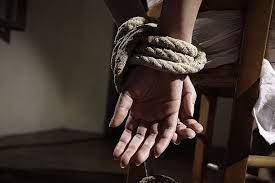Most, not all, of the kidnapping cases in Nigeria appear to be purely mercenary. These kidnappings are different from Boko Haram attacks where the goal was to kill those who benefit from Western education.
Kidnappers are after ransom and appear to try to keep their victims alive. Nigerian federal, and state authorities and individuals always deny paying ransom. Yet they often do so.
But, this week, the Minister of Defence, Mohammed Badaru Abubakar, expressed concern over the persistent payment of ransom by Nigerians, particularly the rising cases of crowd-funding on social media platforms, saying that such action fuels kidnappings in the country.
He said that raising huge money to free abductees in the hands of kidnappers is against the law and counter-productive.
The remarks by the minister followed a series of tragic kidnappings on the outskirts of Abuja. In one of these episodes, the captors, who initially seized 10 individuals from Sagwari Layout, Dutse, Abuja, on January 7, 2024, escalated their ransom demands from N60 million to N100 million for each of the seven remaining hostages, in response to public efforts to raise funds through social media.
Tragically, three hostages were by their captors who blamed the delay in paying ransoms for their actions.
The situation became worrisome when the former minister of Communications and Digital Economy, Professor Isa Ali Ibrahim Pantami, endorsed the crowd-funding approach after an anonymous associate of his contributed N50 million for the payment of ransom.
This development has sparked heightened concern on social media platforms, as many worry that resorting to public fundraising for ransom payments might encourage similar incidents in the future.
“In FCT, these kidnappings happen around the suburbs, and around locations that are bordering Kaduna and Niger states. And this is as a result of the current operations going on in the North-west and some parts of North-central (zones),” the minister said. “The bandits are fleeing and they are getting shelters around these areas and the security agencies are working very hard to push them out, block their movements and finish this thing once and for all. The president has given us the marching order and all the support that we need and what the security agencies need to end this thing.”
On crowd-funding, the minister said there’s an existing law against payment of ransom. “It is very sad for people to go over the internet, and radio asking for donations to pay ransom. This will only worsen the situation. It will not help the situation at all as you have seen,” he said. “We have to stop responding to payment of ransom. If we stop, over time, the kidnapping will not be profitable and they will stop. It is not easy though but that is the law. So we want to call on the people to manage the kidnapping situation intelligently and very quietly because talking too much about it, most especially raising funds through the public media is not productive at all and should be discontinued.”
Thus, with a law against payment of ransom in place, could the tracking of financial transactions be of some assistance in fighting this problem? The fight against piracy has been aided, for example, by tracking the financial transactions of Somali pirates in Kenya.
While pirates engage in kidnapping for personal gain, terror groups use proceeds to further their activities. Putting an end to political instability and zones of lawlessness remain some of the only ways to stop kidnapping for ransom in Africa and elsewhere.
An agreement among states in Nigeria to implement the law prohibiting the payment of ransoms will also certainly assist.
However, beyond the matter of paying or not paying ransom, the major issue is the capacity to check such crimes and to ensure they are not committed. The question, therefore, is, do the police or security agencies have the technology, the necessary device to track down the kidnappers or even foil their plans before they carry them out?
Do the police have the device to detect the exact location where kidnappers are to foil their plans? Again, paying or not paying the ransom is not the issue because it does not mean that paying the ransom means they would release their victim unharmed.
There have been cases where even after collecting the ransom, they still killed the victims. So, what is important is that the police should prevent the crime from happening in the first place. After all, there should have been no controversy over payment of ransom if the safety of Nigerians were guaranteed, in the first place.
In the end, until the security agencies are so prepared to fight kidnapping the way they are fighting insurgency in the North with all the seriousness it deserves, Nigeria will continue to grapple with the unfortunate situation.




